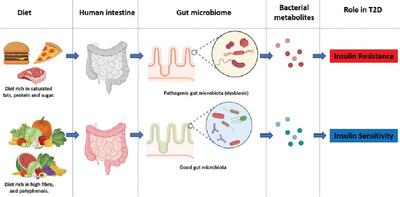当前位置:
X-MOL 学术
›
Mol. Nutr. Food Res.
›
论文详情
Our official English website, www.x-mol.net, welcomes your
feedback! (Note: you will need to create a separate account there.)
Synergistic Interplay of Diet, Gut Microbiota, and Insulin Resistance: Unraveling the Molecular Nexus
Molecular Nutrition & Food Research ( IF 4.5 ) Pub Date : 2024-11-16 , DOI: 10.1002/mnfr.202400677 Rajesh Kanna Gopal, Pitchaipillai Sankar Ganesh, Naji Naseef Pathoor
Molecular Nutrition & Food Research ( IF 4.5 ) Pub Date : 2024-11-16 , DOI: 10.1002/mnfr.202400677 Rajesh Kanna Gopal, Pitchaipillai Sankar Ganesh, Naji Naseef Pathoor

|
This comprehensive review explores the intricate relationship between gut microbiota, diet, and insulin resistance, emphasizing the novel roles of diet-induced microbial changes in influencing metabolic health. It highlights how diet significantly influences gut microbiota composition, with different dietary patterns fostering diverse microbial communities. These diet-induced changes in the microbiome impact human metabolism by affecting inflammation, energy balance, and insulin sensitivity, particularly through microbial metabolites like short-chain fatty acids (SCFAs). Focusing the key mediators like endotoxemia and systemic inflammation, and introduces personalized microbiome-based therapeutic strategies, it also investigates the effects of dietary components—fiber, polyphenols, and lipids—on microbiota and insulin sensitivity, along with the roles of protein intake and amino acid metabolism. The study compares the effects of Western and Mediterranean diets on the microbiota-insulin resistance axis. Therapeutic implications, including probiotics, fecal microbiota transplantation (FMT), and personalized diets, are discussed. Key findings reveal that high-fat diets, especially those rich in saturated fats, contribute to dysbiosis and increased intestinal permeability, while high-fiber diets promote beneficial bacteria and SCFAs. The review underscores the future potential of food and microbiota interventions for preventing or managing insulin resistance.
中文翻译:

饮食、肠道微生物群和胰岛素抵抗的协同相互作用:解开分子联系
这篇全面的综述探讨了肠道微生物群、饮食和胰岛素抵抗之间的复杂关系,强调了饮食诱导的微生物变化在影响代谢健康方面的新作用。它强调了饮食如何显着影响肠道微生物群的组成,不同的饮食模式促进了不同的微生物群落。这些饮食诱导的微生物组变化通过影响炎症、能量平衡和胰岛素敏感性来影响人体新陈代谢,特别是通过短链脂肪酸 (SCFA) 等微生物代谢物。它侧重于内毒素血症和全身炎症等关键介质,并引入了基于微生物组的个性化治疗策略,还研究了膳食成分(纤维、多酚和脂质)对微生物群和胰岛素敏感性的影响,以及蛋白质摄入和氨基酸代谢的作用。该研究比较了西方和地中海饮食对微生物群-胰岛素抵抗轴的影响。讨论了治疗意义,包括益生菌、粪便微生物群移植 (FMT) 和个性化饮食。主要研究结果表明,高脂肪饮食,尤其是富含饱和脂肪的饮食,会导致菌群失调和肠道通透性增加,而高纤维饮食会促进有益细菌和 SCFA。该评论强调了食物和微生物群干预在预防或管理胰岛素抵抗方面的未来潜力。
更新日期:2024-11-16
中文翻译:

饮食、肠道微生物群和胰岛素抵抗的协同相互作用:解开分子联系
这篇全面的综述探讨了肠道微生物群、饮食和胰岛素抵抗之间的复杂关系,强调了饮食诱导的微生物变化在影响代谢健康方面的新作用。它强调了饮食如何显着影响肠道微生物群的组成,不同的饮食模式促进了不同的微生物群落。这些饮食诱导的微生物组变化通过影响炎症、能量平衡和胰岛素敏感性来影响人体新陈代谢,特别是通过短链脂肪酸 (SCFA) 等微生物代谢物。它侧重于内毒素血症和全身炎症等关键介质,并引入了基于微生物组的个性化治疗策略,还研究了膳食成分(纤维、多酚和脂质)对微生物群和胰岛素敏感性的影响,以及蛋白质摄入和氨基酸代谢的作用。该研究比较了西方和地中海饮食对微生物群-胰岛素抵抗轴的影响。讨论了治疗意义,包括益生菌、粪便微生物群移植 (FMT) 和个性化饮食。主要研究结果表明,高脂肪饮食,尤其是富含饱和脂肪的饮食,会导致菌群失调和肠道通透性增加,而高纤维饮食会促进有益细菌和 SCFA。该评论强调了食物和微生物群干预在预防或管理胰岛素抵抗方面的未来潜力。






























 京公网安备 11010802027423号
京公网安备 11010802027423号